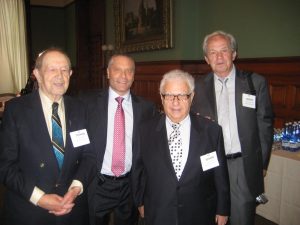“To imagine 100 people in there feels impossible.”
“It’s explained how many people were in these cars, but it’s hard to imagine when you’re reading it in a history book. Ten of us were in there, and to imagine 100 people in there feels impossible. It’s a lot to take in.”
That was the reaction of Samara Bengall after touring The Cattle Car: Stepping In and Out of Darkness, an immersive Holocaust exhibit that pulled throngs of people to downtown Toronto’s Trinity Bellwoods park Oct. 24 and 25.
“It’s hard to explain how it felt, being in there and thinking about my family who died in the Holocaust,” Bengall said.
Hosted inside an exact replica of the railway cars that ferried millions to their deaths, the exhibit utilizes several projectors to create a 360-degree experience. The film projected inside the car is made up of survivor stories, historical re-creations and information about the Holocaust.
“Everyone stopped to look at it. We kept turning people away because we were at capacity,” said organizer Jordana Lebowitz. “People left crying.”
“Gives kids an opportunity to learn in a new way”

The exhibit was created by Lebowitz in 2019 for Holocaust Education Week at Guelph University, where she was a student. Thousands of students visited it while it was displayed and Lebowitz continued with the project after education week ended.
Since COVID restrictions lifted, Lebowitz says that teachers have been enthusiastic about bringing the exhibit to their schools, and the exhibit is currently booked up until early March.
“It’s a different kind of learning, it really gives kids an opportunity to learn in a new way,” she said.
Beginning in November, The Cattle Car will visit Ontario university campuses for Holocaust Education Week, spending time at Laurier and Waterloo before temporarily returning to Guelph. After that, the exhibit will be transported to the southern United States for three months.
“You can’t turn away from this. It grabs you.”
Sagi Kahane-Rapport is the creative director of ShadowLight, the non-profit organization developed by Lebowitz to further her Holocaust education outreach.
Kahane-Rapport says the project is designed to educate those with little-to-no knowledge while still offering an impactful experience to those with prior education.
“For some of the schools we’re going to be visiting this might be the only Holocaust education they get,” said Kahane-Rapport. “For us it was important to give a level of understanding through emotion, but also include the historical side that gives you context about what the Holocaust was, what happened and why it happened.”
Kahane-Rapport notes that the benefit of a digital exhibit is that it can be updated to include information about rising antisemitism and the decline of Holocaust knowledge among young people.
“The Holocaust is unique, but there are things that you see now that are reminiscent of the beginnings, so you want to make sure people can identify those,” said Kahane-Rapport. “People growing up in this generation can identify those and take action before it’s too late.”
According to Lebowitz at least one person approached them in the downtown park on Monday who had never heard of the Holocaust, something she has also experienced at other showings.
“It’s hard to get people to learn about stuff, but we can go to them,” said Lebowitz. “You can’t turn away from this. It grabs you.”
The Cattle Car: Stepping In and Out of Darkness will be at Laurier University from Nov. 1-4, Waterloo University from Nov. 4-8, and Guelph University from Nov. 8-12 before going on a three-month tour of Florida, Georgia, and North and South Carolina.
A video of its 2020 launch at the Toronto Railway Museum:







